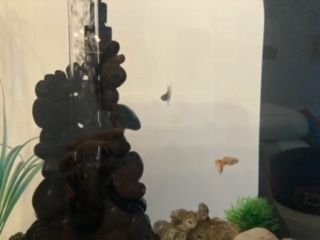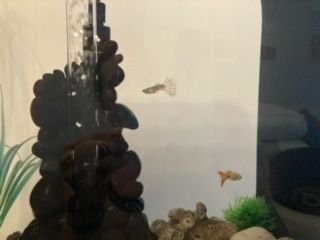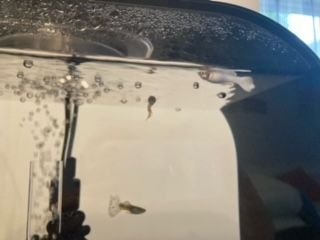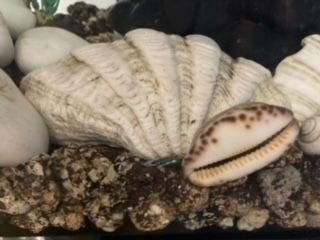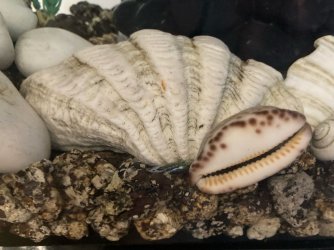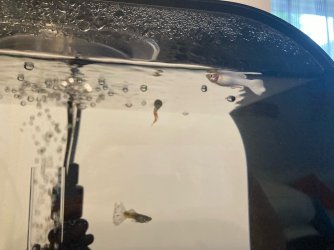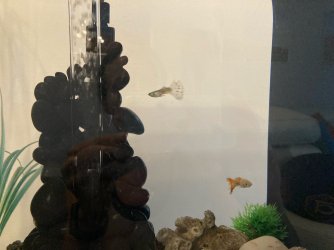It's unlikely to be Fish Tuberculosis (TB). It doesn't kill lots of fish in a tank rapidly. One fish dies here, a few months later another one dies, Some time later another dies.
Fish that die from TB (Mycobacteria) normally have major organ failure when the bacteria destroy an internal organ. The fish then bloats up overnight, stops eating, usually does a stringy white poop, breathes heavily at the surface or near a filter outlet, and dies within 24-48 hours of showing these symptoms.
If you wash your hands and arms with warm soapy water after working in the fish tank, it is very unlikely you will get a Fish TB infection.
The only way you can get a fish TB infection (called a granuloma) is if you have open wounds (cuts, scratches) on your skin and you get Mycobacteria contaminated water on/ in the wound. Then you might get a localised infection that needs antibiotics. However, most people never get an infection and those at highest risk of developing an infection are people with a weakened immune system, the old, sick, people with cancer, heart problems or diabetes. The average healthy person won't normally get an infection.
If you do get a small lumpy sore on your hands or arms and it doesn't heal after a couple of weeks, tell your doctor you keep fish and have concerns about it being Fish TB. Get your doctor to take a swab of the sore and send it off for culturing. Your doctor will probably try to put you on antibiotics. Tell them NO, not until I have the results for the swab back. Plenty of people get put onto antibiotics and if they use the wrong antibiotics, it doesn't get rid of the infection and simply makes it drug resistant to that medication. So find out what it is before taking anything for it.
While you wait for the results from the lab, you can try putting raw honey on the wound and bandaging it up. Use a bandage that does not stick to the skin because these can damage the skin and let the infection spread. Just use a bandage that has a clip to hold it in place or wrap the sore in a tissue and put some tape around the tissue so it stays put but the tape isn't in contact with the skin. Wash the sore twice a day, dry it with a tissue and re-apply honey and a new bandage. Honey has antimicrobial properties and can kill various bacteria, fungus, viruses and other things. It won't hurt you but it might stop the infection before you end up on antibiotics.
Fish that die from TB (Mycobacteria) normally have major organ failure when the bacteria destroy an internal organ. The fish then bloats up overnight, stops eating, usually does a stringy white poop, breathes heavily at the surface or near a filter outlet, and dies within 24-48 hours of showing these symptoms.
If you wash your hands and arms with warm soapy water after working in the fish tank, it is very unlikely you will get a Fish TB infection.
The only way you can get a fish TB infection (called a granuloma) is if you have open wounds (cuts, scratches) on your skin and you get Mycobacteria contaminated water on/ in the wound. Then you might get a localised infection that needs antibiotics. However, most people never get an infection and those at highest risk of developing an infection are people with a weakened immune system, the old, sick, people with cancer, heart problems or diabetes. The average healthy person won't normally get an infection.
If you do get a small lumpy sore on your hands or arms and it doesn't heal after a couple of weeks, tell your doctor you keep fish and have concerns about it being Fish TB. Get your doctor to take a swab of the sore and send it off for culturing. Your doctor will probably try to put you on antibiotics. Tell them NO, not until I have the results for the swab back. Plenty of people get put onto antibiotics and if they use the wrong antibiotics, it doesn't get rid of the infection and simply makes it drug resistant to that medication. So find out what it is before taking anything for it.
While you wait for the results from the lab, you can try putting raw honey on the wound and bandaging it up. Use a bandage that does not stick to the skin because these can damage the skin and let the infection spread. Just use a bandage that has a clip to hold it in place or wrap the sore in a tissue and put some tape around the tissue so it stays put but the tape isn't in contact with the skin. Wash the sore twice a day, dry it with a tissue and re-apply honey and a new bandage. Honey has antimicrobial properties and can kill various bacteria, fungus, viruses and other things. It won't hurt you but it might stop the infection before you end up on antibiotics.


